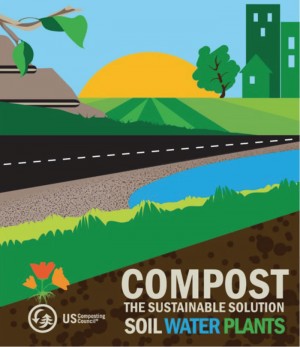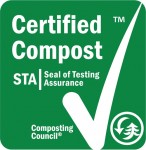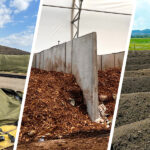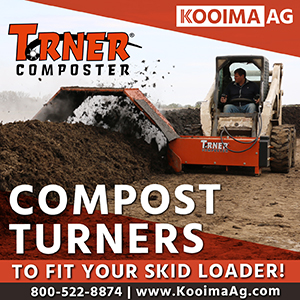In a new development, the US Composting Council’s Seal of Testing Assurance Program can now be defined as a certification program.
Ron Alexander and Al Rattie
BioCycle July 2015
The US Composting Council (USCC) is celebrating the 15th year of its Seal of Testing Assurance (STA) Program. The overall purpose of the STA Program is to improve customer confidence in compost selection and utilization, thus improving compost’s image and marketability. However, the USCC has identified a number of other benefits of the program for both individual composters and the overall compost manufacturing industry. These include:
• Serving as a quality control function for compost manufacturers
• Standardizing a set of test parameters (and methods) for use in evaluating compost product quality
• Acting as a framework to allow implementation of established numerical product standards/specifications (e.g., state Departments of Transportation)
• Assisting in implementation of an inspection or quality verification program for compost specifiers
What Is STA?
STA is a testing and information disclosure program. There are many different types of compost, produced from a variety of different feedstocks. These products look different and may perform differently in particular applications and conditions therefore they must be used correctly. Correct compost usage, however, is a function of having the appropriate product, as well as accurate usage information. The consumer has a right and the compost manufacturer has an obligation to make this information available to customers. Key elements of the STA program are on the USCC’s website.
 In a new development, the STA Program can now be defined as a “certification program.” The USCC’s Market Development Committee understood that “STA Compost” resonates well with most of the professional landscaping industry, but may not be the most user friendly term for residential consumers of compost products. The USCC completed the marketing and legal steps needed to allow the Council to promote STA participating composts as “STA Certified Composts” (the trademarking process is underway).
In a new development, the STA Program can now be defined as a “certification program.” The USCC’s Market Development Committee understood that “STA Compost” resonates well with most of the professional landscaping industry, but may not be the most user friendly term for residential consumers of compost products. The USCC completed the marketing and legal steps needed to allow the Council to promote STA participating composts as “STA Certified Composts” (the trademarking process is underway).
Creating STA Certified Compost will strengthen the STA brand and make it more identifiable for the retail compost consumer. The USCC will launch a national campaign to promote STA Certified Compost through both industry and related media outlets.
Related Initiatives
“Growing A Greener World”
One of the more well-known media outlets is the “Growing A Greener World” (GGW) television series, broadcast on PBS stations across the U.S. The USCC has a partnership with GGW to promote STA Certified Compost usage. Joe Lamp’l, gardening guru and host of the show, is helping to spread the news about the many benefits and uses of STA Certified Compost. Attendees of the USCC’s annual conference in January 2015 got a “sneak peek” of Lamp’l’s introductory video. He is collaborating with the USCC to create content for his 2015 national television GGW broadcast that will emphasize the importance of using STA Certified Compost products.
Working with GGW helps promote compost use to homeowners (the “buying public”), which can be difficult and expensive to do. But the Council has a unique opportunity at the moment, with many homeowners and professionals alike knowing they need to “fix the soil” to easily grow healthy and vigorous plants…..as well as conserve and protect both water and soil, reduce plant loss and help mitigate the effects of climate change.
 Compost — The Sustainable Solution
Compost — The Sustainable Solution
To assist compost manufacturers expand commercial-scale project markets, the USCC has developed “Compost — The Sustainable Solution” program. The overall goal is to enhance the marketability of compost on large commercial projects, while positively affecting landscape plant/turf establishment and survival (while reducing input materials); erosion and sediment control (and the contaminants attached to them); reductions in irrigation water usage volumes in landscape settings; and management of storm water (promoting green infrastructure).
Major initiatives planned for the program are:
Raising Soil Organic Matter: The USCC’s “Strive for 5%” (SF5%) concept promotes planting ornamental plants only after the soil organic matter is raised to 5 percent. In some ways, this initiative would take Western Washington’s Soils for Salmon (buildingsoil.com) concept national, but promoted regionally, based on regional issues. The program could be promoted to reduce use of irrigation water in landscapes, protect surface waters from contamination transported through erosion and storm water or simply to reduce storm water management infrastructure.
Manufacturing Topsoil With Compost: The SF5% concept also promotes topsoil manufacturing with compost for the benefit of the plant(s), the environment and the economy (cheaper than ‘hard’ engineering solutions). Another important component is “healthy soils, help plants thrive,” while reducing plant loss and maintenance inputs (e.g., water, fertilizer, pesticides).
Using Compost-Based Technologies: SF5% will promote compost-based green infrastructure tools for erosion and storm water control, from topsoil manufacturing (SF5%) and compost berms, blankets and socks to green roofs, bioswales, bioretention ponds, rain gardens, etc. There are many possible partners to promote this concept.
The USCC has already created some tools for STA participants to use in introducing this program to the marketplace. These areas of concentration within the program were chosen because compost can be of major benefit to them, both technically and economically. Further, most compost manufacturers would agree that these markets could expand considerably over the next decade. They can also positively impact climate change, as well as mitigate its effects.
Ron Alexander is president of R. Alexander Associates, Inc. (www.alexassoc.net), specializing in product and market development for organic recycled products. He is author of ‘The Practical Guide to Compost Marketing and Sales’ (2nd Edition published by The JG Press, Inc.) and serves as cochair of the USCC’s Market Development Committee and the USCC’s Industry Liaison to AAPFCO.














